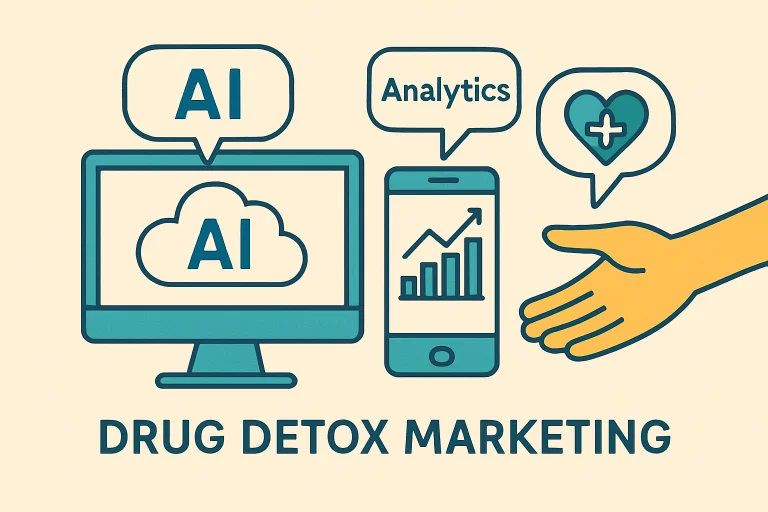Table of Contents
- Data-Driven Marketing: Harnessing Analytics for Personalized Outreach
- AI Integration: Enhancing Engagement and Efficiency
- Telehealth Services: Expanding Access to Treatment
- Ethical Marketing: Building Trust Through Transparency
- Content Strategies: Educating and Engaging Audiences
- Social Media: Connecting with Communities
- Future Trends: Preparing for the Next Wave in Detox Marketing
In today’s fast-paced healthcare environment, drug detox centers must innovate continuously to stay ahead in an increasingly competitive field. Implementing strategies that combine technological advancements and personalized care has become essential for connecting with and helping those seeking treatment. As prospective clients become more savvy online, facilities that connect compassionate messaging with digital tools gain a significant advantage. Effective drug detox marketing requires modern, ethical, and personalized approaches. With the ongoing opioid crisis, innovations like AI, telehealth, and advanced analytics allow providers to better understand, engage, and support individuals in need. Balancing patient privacy with business goals through data-driven strategies and transparent communication builds trust.
Connect with the platform that turns big ideas into bigger achievements.
Data-Driven Marketing: Harnessing Analytics for Personalized Outreach
Leveraging data analytics provides invaluable insights into how individuals research and select drug detox programs. By assessing patient demographics, referral sources, and digital behaviors, marketers can create personalized content and tailor advertising to meet people at various decision stages. For instance, predictive models analyze browsing patterns to deliver focused messages to those most likely to need help, increasing both engagement and conversion rates.
Recent advancements in healthcare marketing technology have also enabled real-time feedback and campaign performance tracking, which empowers detox centers to adjust strategies instantly and optimize return on investment. Such agility means clients receive the most relevant information when it matters most.
AI Integration: Enhancing Engagement and Efficiency
Artificial intelligence is fast becoming a cornerstone of modern drug detox marketing. AI-powered chatbots answer questions, offer resources, and even pre-qualify leads instantly freeing staff to focus on clinical care. Natural language processing algorithms also help marketers identify common concerns in online queries, facilitating content that directly addresses audience needs. Furthermore, AI streamlines scheduling for assessments and telehealth appointments, making the intake process more efficient and user-friendly.
Machine learning models can predict which potential clients may be most receptive to outreach. By analyzing social media interactions, educational content engagement, and ad responses, AI tools help refine messaging and prioritize follow-up, thereby improving overall conversion rates.
Telehealth Services: Expanding Access to Treatment
Telehealth is now integral to addiction treatment. By offering remote clinical consultations and counseling, centers can reach individuals who previously faced barriers such as geography or stigma. Marketing telehealth’s flexibility, privacy, and convenience appeals to users hesitant to seek in-person care. Showcasing testimonials and case studies of successful remote recoveries further strengthens credibility and reduces the perceived distance between the patient and the provider.
Ethical Marketing: Building Trust Through Transparency
In addiction services, reputation and trust are paramount. Ethical marketing requires full transparency regarding treatment options, success rates, and program costs. Clearly presenting this information without inflated promises or misleading claims helps families make confident, informed decisions. Publishing third-party reviews, accreditations, and evidence-based outcomes enhances credibility and strengthens a center’s reputation within the community. According to MasterClass, maintaining integrity while promoting services is a key component of effective ethical marketing.
Transparency doesn’t just build trust; it’s essential for regulatory compliance and industry best practices. Many families research extensively before reaching out, ensuring your messaging is accurate and honest is the most effective way to establish respect and rapport that leads to lasting referrals and positive outcomes.
Content Strategies: Educating and Engaging Audiences
Informative, targeted content serves a dual purpose: it educates prospective clients and positions your center as a leader in addiction care. Blog articles on frequently asked questions, video testimonials, and interactive webinars help demystify the detox process. Educational outreach also supports SEO and organic growth, establishing authority with both audiences and search engines. Collaborating with industry professionals and publishing expert interviews or recovery guides are additional strategies to provide value and stand out.
Comprehensive content does more than attract leads; it empowers individuals to seek help proactively, transforming passive visitors into engaged participants in their own recovery journey.
Social Media: Connecting with Communities
Maintaining an active social media presence enables drug detox centers to build genuine, supportive connections. Interactive elements such as live Q&A sessions, recovery stories, and daily encouragement posts reduce stigma, inspire hope, and build brand loyalty. Social platforms are also ideal for rapid updates, event promotion, and sharing community outreach initiatives, reaching people across all demographics.
Utilizing social listening tools and monitoring online trends allows marketers to respond proactively to public sentiment or emerging concerns, keeping engagement positive and helpful. Bringing clinical staff into the conversation either through direct response or hosting live educational sessions can humanize the brand and foster meaningful, trust-based relationships.
Future Trends: Preparing for the Next Wave in Detox Marketing
Staying ahead in drug detox marketing demands continued investment in emerging technologies and approaches. The adoption of virtual reality therapy, for example, is beginning to reshape addiction treatment by enhancing patient immersion and engagement in counseling sessions. Additionally, emerging tools like blockchain-based patient records are on the horizon, offering enhanced security and transparency for sensitive health information.
Detox centers that adapt quickly to these technological waves remain most relevant and effective in guiding clients from crisis to recovery. Anticipating and embracing innovation while never losing sight of ethical responsibilities and personalized care will shape the future of addiction treatment marketing.
Discover innovation that transforms your vision into unstoppable growth.






